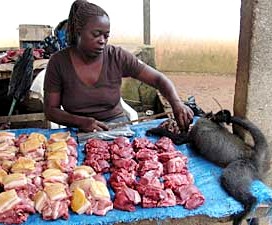|
Gabon Society | Environment - Nature Gabon officials seize chimpanzee body parts
The raids, conducted by the country's Water and Forest and Defence Ministries with the assistance of the local environmentalist group Support for the Application of the Wildlife Act (AALF), yielded what the activists called "an alarming number of ape, leopard and elephant parts."
The local group AALF is a joint programme of Gabon's Water and Forest Ministry, Conservation Justice and Brainforest. AALF assists local authorities with wildlife crime investigations and supports rigorous prosecutions. It follows a model established by the Last Great Ape Organisation in Cameroon, which has been replicated with success in neighbouring countries. "The problem of illegal wildlife poaching and trade is not specific to Gabon; such specialized dealers exist throughout Western and Central Africa. But these arrests demonstrate that stopping them is possible with effective law enforcement," said Luc Mathot, founder of Conservation Justice. The suspects are being held in custody while an investigation is conducted. They are expected to appear in court for legal proceedings this week. "Recent ivory poaching prosecutions prove that the judicial authorities in Gabon now regard wildlife cases with high importance. We hope they will do the same for ape and big cat cases such as this one," Mr Mathot said. "This monumental arrest is only the first step toward catalysing positive change in upholding wildlife law in Gabon. In order to establish a long-term deterrent to committing wildlife crime, appropriate consequences must be applied in this and all cases of illegal poaching and trade," concluded Mr Greer. By staff writer © afrol News - Create an e-mail alert for Gabon news - Create an e-mail alert for Society news - Create an e-mail alert for Environment - Nature news
On the Afrol News front page now
|
front page
| news
| countries
| archive
| currencies
| news alerts login
| about afrol News
| contact
| advertise
| español
©
afrol News.
Reproducing or buying afrol News' articles.
You can contact us at mail@afrol.com









